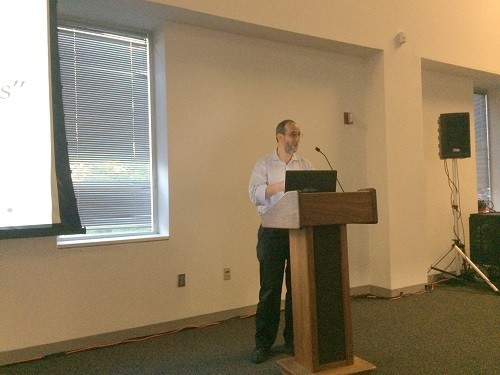At Innovation Technology Meetup Anniversary, Ehrlich Provides Insight Into Angel Mindset

The Innovation Technology Meetup at New Jersey Institute of Technology (NJIT), founded by startup entrepreneur Michael Ligouri, celebrated its first anniversary June 19, 2014, with three startup pitches and a down-to-earth presentation by Michael Ehrlich.
Ehrlich, an NJIT (Newark) professor, is also an angel investor with New York Angels and NJIT Highlanders Angel Network (Newark). His talk focused on what entrepreneurs need to know about angel investors.
Ehrlich passed along advice about how to phrase one-page executive summaries to get the right kind of attention from potential investors who may look at 50 of them every month.
The first thing startup entrepreneurs should know is that angels want to help them with more than money, Ehrlich said.
Angels are usually entrepreneurs who have had a successful exit. They have been in the startup founders’ shoes, and they want to help them succeed by providing connections to the angels’ network or advising them.
“If it’s just about writing a check, they probably won’t be interested,” said Ehrlich.
Most angels invest in people, not ideas. “If I don’t think the person is the type … that can bring a business to a successful conclusion, they can talk about a great idea, but I’m not going to invest,” Ehrlich said.
“Conversely, if I think that this is a great person who has the right sort of energy, passion and integrity but doesn’t have a great business model, I’m pretty sure we can help find one,” he said.
Entrepreneurs’ credibility is really their greatest single asset, Ehrlich noted. Be careful not to oversell yourself, he advised.
Angels are looking to reinvest in their former selves, said Ehrlich. “They may be looking to replicate themselves [in] maybe a younger, hipper version. … finding that bonding rapport and identifying with the potential investor” is an entrepreneur’s strength, he added.
Entrepreneurs often hear the advice “Be coachable,” Ehrlich said. In fact, angel investors are looking for people they can work with. They don’t want to be CEO, but they do expect that if they give advice, the entrepreneur will try it out. Not following through — not doing your homework — is a big turnoff, he noted, illustrating his point with the example of an entrepreneur who was rejected for that reason.
If a mentor gives you advice and you try it, you should report back on what happened, Ehrlich said. With any luck it will be good advice, and you’ll go back for more.
Sometimes mentors will give you bad advice, however. Said Ehrlich, “Go back to them anyway and tell them what happened … now the mentor will owe you a better piece of advice.”
The entrepreneur’s job in the investor relationship is to continue to “de-risk” the business. A business can be de-risked by proving that the technology works, securing intellectual property, identifying customers, getting actual customer orders and building a great team that can run the business well, Ehrlich said. “It also means that you can build to scale and reproduce those sales,” he said.
Ehrlich went on to discuss a scholarly article he cowrote with Annaleena Parhankangas, “How entrepreneurs seduce business angels: An impression management approach,” which appeared in the Journal of Business Venturing.
In a business’s very early stages, it’s a real problem to marry money and ideas, he said. Entrepreneurs have to determine how to make a positive impression on investors. A way to do that is to ensure the executive summary they send prospective investors is as strong as possible.
“That one-pager is going to be like the sorting hat in ‘Harry Potter,’ ” Ehrlich said. “Where you are going is going to be determined by where the one-pager sends you.”
For the journal article, Ehrlich and Parhankangas reviewed several hundred one-page executive summaries submitted to New York Angels. By examining how the startups presented their businesses, the authors were able to predict to some extent who would get funded and who would not.
The results revealed that investors have to be positive and enthusiastic about their businesses but careful not to overhype them. “It’s the Goldilocks principle; you want to find the sweet spot,” Ehrlich said.
He advised the entrepreneurs not to say they have no competition. That can mean nobody actually cares about your business, which is not the impression you want to give, he said.
Entrepreneurs should present themselves as having opinions that conform to those of potential investors. If you can make yourself similar to them, they will give you money because you are in sync.
The article also confirmed that entrepreneurs must make an “ask,” or a request of investors. They must ask investors for something in addition to money, such as help with a problem.
A video of Ehrlich’s talk by Andrew Hines can be found here.

